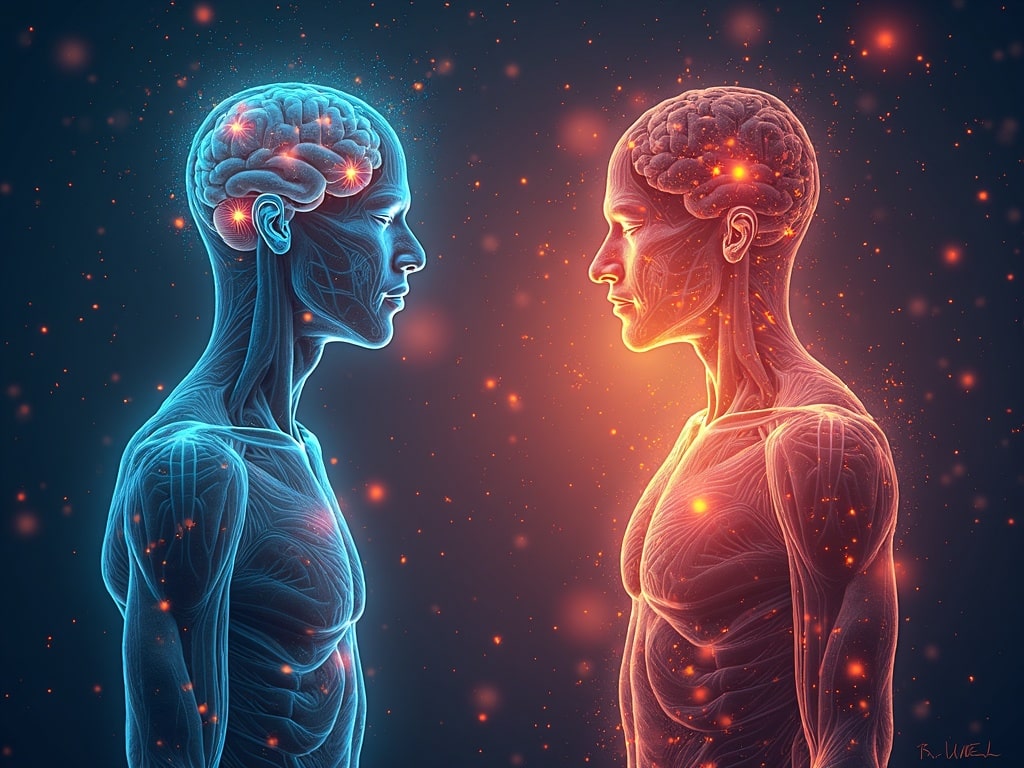What Causes a Sudden Loss of Libido in a Man? Understanding the Root Causes and Solutions
Imagine a once roaring fire reduced to mere embers. That's what a sudden loss of libido can feel like for a man, leaving him confused, frustrated, and perhaps even worried about his relationship and overall well-being. It's a surprisingly common issue, but often shrouded in silence. Let's break down the complex web of factors that can contribute to this decline and explore potential paths to reignite the flame.
The Multifaceted Nature of Male Libido
Libido, or sexual desire, in men is a complex interplay of physical, psychological, and social elements. It's not simply a matter of hormones; it's a delicate balance that can be easily disrupted. Understanding this complexity is the first step in pinpointing why a man might experience a sudden decrease in his sex drive.
Hormonal Imbalances: The Testosterone Connection
Testosterone is often hailed as the key hormone for male libido, and rightfully so. It plays a crucial role in sexual desire, erectile function, and overall energy levels. A sudden drop in testosterone can indeed cause a significant decrease in libido.
- Age: Testosterone levels naturally decline with age, typically starting around 30. However, a sudden and drastic drop is not normal.
- Medical Conditions: Conditions like hypogonadism, where the body doesn't produce enough testosterone, can be a primary culprit.
- Medications: Certain medications, such as antidepressants, opioids, and anabolic steroids (paradoxically, after cessation), can interfere with testosterone production or function.
It's important to note that testosterone isn't the only hormone involved. Other hormonal imbalances, such as thyroid problems, can also indirectly impact libido.
Psychological Factors: The Mind-Body Link
The brain is arguably the most powerful sex organ. Psychological factors can have a profound impact on libido, sometimes even overshadowing physical causes.
- Stress: Chronic stress elevates cortisol levels, which can suppress testosterone and dampen sexual desire. Think of a stressed-out executive unable to unwind, their mind racing even during intimate moments.
- Depression and Anxiety: Mental health conditions like depression and anxiety can significantly decrease libido. The emotional exhaustion and negative thought patterns associated with these conditions can make it difficult to experience sexual desire. Furthermore, medications used to treat them can also contribute to low libido.
- Relationship Issues: Unresolved conflicts, lack of communication, and emotional distance within a relationship can erode sexual desire. Feeling disconnected from your partner can translate to a lack of interest in physical intimacy.
- Performance Anxiety: The fear of not performing well sexually can create a self-fulfilling prophecy. The pressure to perform can lead to anxiety and ultimately, erectile dysfunction and decreased libido.
- Body Image Issues: Negative feelings about one's body can lead to decreased self-esteem and a reluctance to engage in sexual activity.
Physical Health and Lifestyle: The Foundation of Desire
Underlying health conditions and lifestyle choices can significantly impact libido.
- Chronic Illnesses: Conditions like diabetes, heart disease, and kidney disease can affect blood flow, nerve function, and hormone levels, all of which can contribute to low libido.
- Obesity: Excess weight can lead to hormonal imbalances, including lower testosterone and higher estrogen levels.
- Sleep Apnea: This sleep disorder can disrupt hormone production and lead to fatigue, both of which can decrease libido.
- Substance Use: Excessive alcohol consumption and drug use can negatively impact sexual function and desire.
- Lack of Exercise: A sedentary lifestyle can contribute to obesity, hormonal imbalances, and poor overall health, all of which can diminish libido. Regular physical activity, on the other hand, can boost testosterone and improve mood.
- Poor Diet: A diet lacking in essential nutrients can negatively impact hormone production and overall energy levels.

Identifying the Culprit: A Process of Elimination
Determining the cause of a sudden loss of libido often requires a process of elimination, involving a thorough assessment of physical and psychological factors.
Medical Evaluation: Ruling Out Physical Causes
The first step is to consult a doctor for a physical exam and blood tests. These tests can help identify any underlying medical conditions or hormonal imbalances that may be contributing to the problem. Specifically, the doctor may check:
- Testosterone levels: To assess for hypogonadism.
- Thyroid function: To rule out thyroid problems.
- Blood sugar levels: To screen for diabetes.
- Lipid profile: To assess for heart disease risk factors.
The doctor will also review your medical history and current medications to identify any potential contributing factors.
Psychological Assessment: Uncovering Emotional Roadblocks
If physical causes are ruled out, a psychological assessment may be necessary. This may involve talking to a therapist or counselor to explore potential psychological factors, such as stress, depression, anxiety, or relationship issues. A therapist can help you identify and address these issues.
Lifestyle Evaluation: Examining Daily Habits
A careful examination of your lifestyle habits is also crucial. Consider the following questions:
- Are you getting enough sleep?
- Are you managing stress effectively?
- Are you exercising regularly?
- Are you eating a healthy diet?
- Are you consuming excessive alcohol or using drugs?
Addressing any unhealthy lifestyle habits can significantly improve libido and overall well-being.
Reigniting the Flame: Treatment Options and Strategies
The treatment for a sudden loss of libido depends on the underlying cause.
Medical Treatments: Addressing Physical Imbalances
- Testosterone Replacement Therapy (TRT): If low testosterone is the culprit, TRT may be an option. However, it's important to discuss the potential risks and benefits with your doctor.
- Medication Adjustments: If a medication is causing the problem, your doctor may be able to adjust the dosage or switch you to a different medication.
- Treating Underlying Medical Conditions: Addressing any underlying medical conditions, such as diabetes or heart disease, can improve overall health and libido.
Psychological Therapies: Healing the Mind-Body Connection
- Cognitive Behavioral Therapy (CBT): CBT can help you identify and change negative thought patterns and behaviors that may be contributing to low libido.
- Relationship Counseling: If relationship issues are a factor, counseling can help you and your partner improve communication, resolve conflicts, and reconnect emotionally.
- Sex Therapy: Sex therapy can help you address specific sexual concerns, such as performance anxiety or erectile dysfunction.
Lifestyle Changes: Nurturing Sexual Wellness
- Stress Management Techniques: Practicing relaxation techniques, such as yoga, meditation, or deep breathing, can help reduce stress and improve libido.
- Regular Exercise: Exercise can boost testosterone, improve mood, and increase energy levels.
- Healthy Diet: Eating a balanced diet rich in fruits, vegetables, and whole grains can provide the nutrients needed for optimal hormone production and overall health.
- Adequate Sleep: Getting enough sleep is essential for hormone regulation and overall well-being.
- Open Communication with Partner: Talking openly and honestly with your partner about your needs and desires can strengthen your connection and improve sexual satisfaction.
The Importance of Patience and Self-Compassion
Recovering from a sudden loss of libido can take time and effort. It's important to be patient with yourself and avoid getting discouraged if you don't see immediate results. Remember to be kind to yourself and focus on making small, gradual changes. Celebrating small victories along the way can help you stay motivated and on track. Recognizing that libido is a fluctuating aspect of life, rather than a constant, can also ease anxiety surrounding the issue.
Ultimately, understanding what causes a sudden loss of libido in a man empowers individuals to take proactive steps toward reclaiming their sexual health and overall well-being. By addressing the underlying physical, psychological, and lifestyle factors, it's possible to reignite the flame and rediscover the joy of intimacy. Don't suffer in silence – seek help, explore your options, and prioritize your sexual health.

